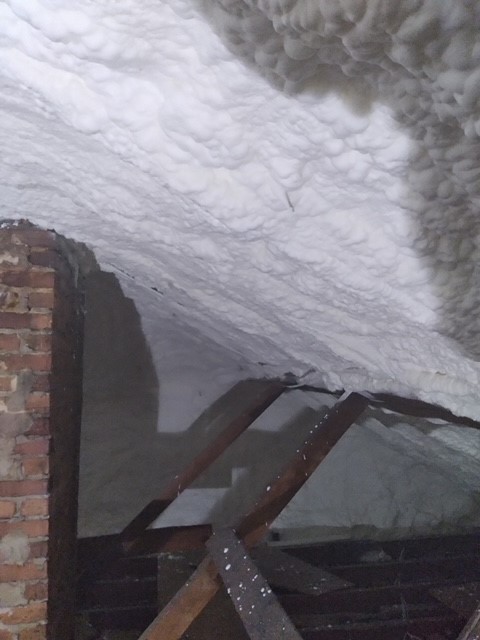What is spray polyurethane foam? Myth or Fact | Koala Insulation

WHAT IS SPRAY POLYURETHANE FOAM INSULATION?
Spray Polyurethane Foam, or SPF, is a high-performance insulation material commonly used in homes and buildings around Atlanta. SPF is particularly known for its ability to help improve the health, comfort, and energy efficiency of a home. Use of the material can dramatically reduce the energy costs associated with heating and cooling, while helping to keep the home interior comfortable year-round, even during the hot summer months in Atlanta. Polyurethane was invented in the 1930s and, has since, become utilized widely and safely in several different applications. In fact, we all interact with polyurethanes daily. Polyurethane can be found in furniture, mattresses, automobiles, airplanes, clothing, shoes, sporting and camping equipment. Additionally, rigid polyurethane foam is used to insulate refrigerators, freezers, coolers, and hot water heaters. The objective of this blog is help you better understand SPF and demystify some of the myths about spray foam.
BENEFITS OF SPRAY FOAM INSULATION
According to Building Green founder Peter Yost, “Building scientists did not fully understand until the late 1970s that 25% – 40% of the total heat loss or gain in a conditioned building can be attributed to air leakage.” Spray foam insulation is an excellent creator of efficiency, as it fills unseen cracks and crevices to make a nice, tight seal that keeps unwanted air out and conditioned air in.
Think about standing on a pier in a stiff winter wind wearing nothing but a t-shirt and jeans. Your teeth are chattering from the cold. I give you the option of either a wind breaker or a loose knit sweater. Which one do you want? The wind breaker, of course. It at least stops the wind, where wind blows right through a sweater. Ideally you want both, a wind breaker (air sealing) over a sweater (insulation). That is what you want with your home, wrapping an air seal around your insulation. Think of a sweater as the insulation to retain your body heat and the windbreaker as an air and vapor barrier.
As a thermal insulator, SPF is one of the highest performing insulations available. It may also be applied in a continuous layer, eliminating most thermal bridges caused by framing. These thermal and air-sealing qualities of spray foam are what directly result in lower home energy bills. Closed-cell SPF, a denser and more rigid version of the material, also provides structural enhancement and can qualify as both a water vapor retarder, a water-resistant insulation and secondary water barrier. It may be applied on the interior of walls, as well as along exterior walls as continuous insulation – above or below grade.
OPEN-CELL OR CLOSED-CELL SPRAY FOAM?
SPF insulation comes in two types, and both products can be used in the climate zone for Atlanta. However, here in Atlanta, we typically put open-cell in attics. Both products provide air sealing and insulation. The R-value of closed-cell Spray Foam is almost twice as that of open-cell Spray Foam installed to the same thickness. Closed-cell foam may also provide vapor-retarder and water resistance performance, as well as help strengthen the walls and roofs of a home.
| Closed-Cell | Open-Cell |
| Higher R-value (greater than 6.0 per inch) | R-value (approximately 3.5 per inch) |
| High moisture barrier (lower moisture permeability) | Lower moisture barrier (higher moisture permeability) |
| Air barrier | Air barrier at full wall thickness |
| Higher strength and rigidity | Lower strength and rigidity |
| Resists water | Not suggested for applications in direct contact with water |
| Medium density (1.75 — 2.25 lbs./ft3) | Lower density (0.4 — 1.2 lbs./ft3) |
| Absorbs sound very well |
MYTH OR FACT:
MYTH #1: SPF is flammable. False…Cured SPF and the chemicals used to make SPF, are not flammable. They are considered ‘combustible’, which like many common building materials, including wood, means it requires a higher-than-normal temperature to ignite. And in some cases, spray foam can improve fire safety by blocking flame spread inside frame walls.
MYTH #2: SPF emits toxic chemicals. False…Following proper installation and curing, SPF does not off gas toxic chemicals. SPF can help prevent unwanted infiltration of pollutants, allergens, and moisture. Combined with proper mechanical ventilation, SPF can improve indoor air quality, our installers wear protective equipment mainly because of short-term chemical hazards during and within a few hours after application.
MYTH #3: SPF creates a home envelope that doesn’t allow a building to ‘breathe’. True…which is good. SPF prevents the infiltration of unwanted moisture and exfiltration of conditioned air which, in turn, can reduce condensation that causes mold, mildew, poor indoor air quality, rot or corrosion of the home. A properly designed spray foam home will also include controlled ventilation to bring in small amounts of outside air to displace odors from normal homeowner activity while minimizing energy loss.
MYTH #4: SPF increases termite infestations. False…SPF is not a food source for wood-destroying organisms like termites. SPF seals cracks and gaps in the home, reducing paths for entry of insects and other pests. SPF also controls infiltration of unwanted moisture, which termites need to thrive. When properly applied, SPF can be installed to allow for regular visual termite inspections by pest management professionals, providing no greater risk to termite damage than any other cavity insulation.
If you think your house is leaking money and could benefit from spray foam, please reach out to us for a fee insulation evaluation. The great benefit to insulation is that it NEVER goes out of style. It saves you money month after month and provides you with a more comfortable home. How can you put a value on that?
Book your free insulation evaluation today with Koala Insulation of Central Atlanta or call us at (404) 994-1287 we would love the opportunity to help.
Find Your Location


Get a quote


